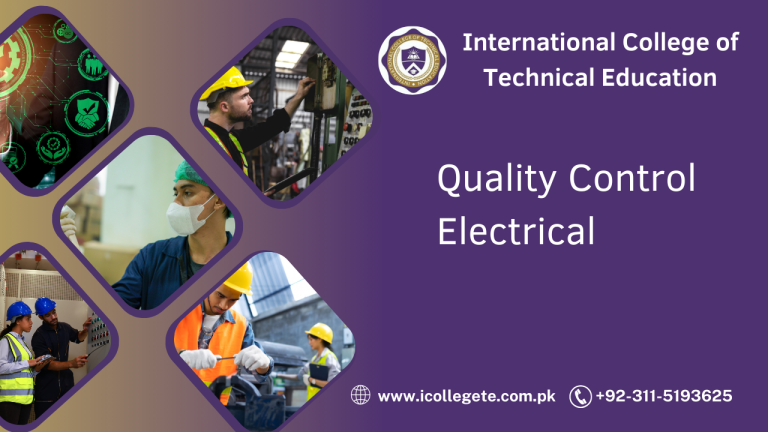In the modern world, buildings are becoming increasingly reliant on sophisticated electrical systems for lighting, heating, security, and other critical functions. As construction projects continue to grow in scale and complexity, the demand for qualified building electricians is on the rise. The Building Electrician Course in Lahore is designed to provide individuals with the skills and knowledge needed to design, install, maintain, and repair electrical systems in both residential and commercial buildings.
The Building Electrician Course is a specialized training program aimed at equipping students with the essential skills to handle electrical installations and systems found in buildings. This course covers a broad range of electrical tasks, from wiring and lighting installation to the safe management of electrical power. By blending theoretical understanding with hands-on practice, this course prepares students to work effectively in the electrical field with a focus on building systems.
Course Overview
The course provides in-depth training in electrical wiring, circuits, and installations that are typically found in residential and commercial buildings. Students will learn how to work with lighting systems, power distribution, electrical panels, and other essential electrical components. In addition, the course covers safety standards, troubleshooting, and the use of electrical tools and equipment, ensuring that students are prepared for real-world challenges in the electrical industry.
The curriculum is designed to help students gain proficiency in both the theoretical and practical aspects of electrical systems, with a strong emphasis on safety, codes, and regulations governing electrical work.
Study Units
The Building Electrician Course typically covers the following study units:
- Introduction to Electrical Systems in Buildings
Understanding the role of electricians, the basics of electricity, and the various types of electrical systems used in buildings. - Basic Electrical Theory
Learning the fundamental principles of electricity, including voltage, current, resistance, Ohm’s Law, and the operation of electrical circuits. - Wiring and Circuit Installation
Techniques for wiring buildings, installing electrical circuits, and connecting power sources to outlets, switches, and appliances. - Lighting Systems Installation
Installing different types of lighting, understanding circuit diagrams, and the installation of both interior and exterior lighting systems in buildings. - Power Distribution and Electrical Panels
Understanding the distribution of electrical power throughout a building, including the installation of electrical panels, breakers, and fuses. - Safety Standards and Regulations
Training on electrical safety protocols, understanding the National Electric Code (NEC), local regulations, and international standards to ensure safe practices. - Troubleshooting and Maintenance of Electrical Systems
Techniques for diagnosing and fixing common electrical issues, such as circuit malfunctions, short circuits, and faulty wiring. - Energy Efficiency and Sustainable Practices
Learning about energy-efficient electrical solutions, including LED lighting, solar power integration, and green building electrical systems. - Electrical Testing and Commissioning
Using tools like multimeters and circuit testers to check electrical systems and ensure they are functioning properly before finalizing installations.
Learning Outcomes
Upon completion of the Building Electrician Course, students will be able to:
- Understand the principles of electricity and how electrical systems function in buildings.
- Install and maintain electrical wiring, power systems, and lighting circuits in residential and commercial buildings.
- Troubleshoot electrical issues, identify faults, and carry out necessary repairs safely and efficiently.
- Adhere to safety standards and building codes, ensuring that all electrical work is done in compliance with national and international regulations.
- Use various electrical tools and testing equipment to install, maintain, and repair electrical systems.
- Understand energy-efficient electrical solutions and sustainable practices for modern building electrical systems.
Course Benefits
- Hands-on Training: The course provides practical, real-world experience in installing and maintaining electrical systems, preparing students for immediate employment.
- High Demand for Electricians: With the growth of the construction industry, skilled building electricians are in high demand, ensuring strong job prospects.
- Lucrative Career Opportunities: Electrical technicians are well-compensated, and there is potential for overtime, promotions, and entrepreneurial ventures.
- Comprehensive Skill Development: Students gain proficiency in all aspects of building electrical work, from wiring to troubleshooting, which opens doors to a wide range of job opportunities.
- Safety and Compliance: Graduates will be well-versed in safety standards, reducing the risk of accidents and ensuring compliance with building codes.
Who Is This Course For?
The Building Electrician Course is perfect for:
- Beginners: Individuals with little to no prior experience in electrical work who are looking to start a career in the building electrical industry.
- Existing Technicians: Those who are already working in related fields like construction or general electrical maintenance but want to specialize in building electrical systems.
- High School Graduates: Students who have completed high school and wish to pursue a practical, rewarding career in electrical systems.
- Entrepreneurs: Individuals interested in starting their own electrical services business specializing in residential or commercial electrical work.
- Construction Professionals: Builders, contractors, and others in the construction industry who wish to gain knowledge in electrical installations for a more comprehensive skill set.
Future Progression
After completing the Building Electrician Course, students can pursue various career paths and further educational opportunities:
- Apprenticeships: Gaining practical work experience with licensed electricians through an apprenticeship program, allowing students to refine their skills and knowledge.
- Certification and Licensing: Obtaining certification from national or local authorities, such as becoming a licensed electrician, which enhances job prospects and credibility.
- Specialized Electrical Courses: Pursuing advanced courses in areas like industrial electrical work, renewable energy systems (solar or wind), or automation systems for further specialization.
- Entrepreneurship: Graduates can start their own electrical services business, offering installation, repair, and maintenance services to both residential and commercial clients.
- Higher Education: Those who wish to continue their education in electrical engineering or related fields can pursue further studies at technical institutes or universities.
With experience, building electricians can also move into supervisory roles, project management, or design and engineering positions.
The Building Electrician Course in Lahore offers an excellent opportunity for individuals looking to start a stable, high-demand career in the electrical field. As the construction and real estate industries continue to expand, the need for qualified electricians who can handle electrical installations in buildings is increasing. Whether you want to work for an established company, start your own electrical business, or specialize in energy-efficient systems, this course provides the foundation for a successful career.






